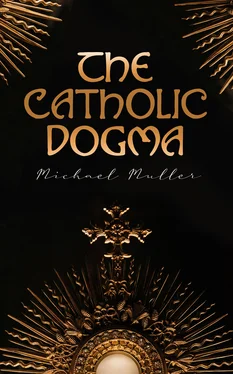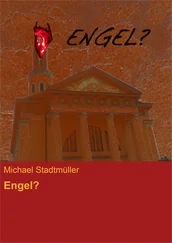5 St. Paul, speaking of such as are led away by what St. Peter calls damnable heresies, says: "A man that is a heretic, after the first and second admonition, avoid; knowing that he that is such an one is subverted and sinneth, being condemned by his own judgment." (Tit. iii. 10.) Other offenders are judged and cast out of the Church by the sentence of the pastors; but heretics, more unhappy, leave the Church of their own accord, and by so doing give judgment and sentence against their own souls. (Sincere Christian by BISHOP HAY.)
Whilst writing this, we remember something remarkable that happened in France, in 1556. It may be well for Mr. Coxe to know it.
It is a well-known fact that the Catholic Church has received power from Jesus Christ to cast out devils and restrain them from injuring any of God's creatures. The Church often makes use of this power. She has instituted certain rites and prayers to be used by bishops and priests in casting out devils from possessed persons. In our little work, Triumph of the Blessed Sacrament, we have related how Almighty God permitted evil spirits to possess a certain person, called Nicola Aubry, of the town of Vervins, in France. The possession took place 1565, and lasted for several months. The Bishop of Laon, by Christ in the Blessed Sacrament, expelled the evil spirits forever, on February 8th, 1566.
When the strange circumstances of Nicola's possession became known everywhere, several Calvinist preachers came with their followers to "expose this popish cheat," as they said. On their entrance, the devil saluted them mockingly, called them by name, and told them that they had come in obedience to him. One of the preachers took his Protestant prayer-book, and began to read it with a very solemn face. The devil laughed at him, and, putting on a most comical face, he said: "Ho! ho! my good friend, do you intend to expel me with your prayers and hymns? Do you think that they will cause me pain? Don't you know that they are mine? I help to compose them?"
"I will expel thee in the name of God," said the preacher solemnly.
"You!" said the devil mockingly. "You will not expel me, either in the name of God, or in the name of the devil. Did you ever hear, then, of one devil driving out another?"
"I am not a devil," said the preacher angrily, "I am a servant of Christ."
"A servant of Christ, indeed!" said Satan with a sneer. "What! I tell you, you are worse than I am. I believe, and you do not want to believe. Do you suppose that you can expel me from the body of this miserable wretch! Ha! go first and expel all the devils that are in your own heart!"
The preacher took his leave, somewhat discomfited. On going away, he said, turning up the whites of his eyes: "Oh Lord, I pray thee, assist this poor creature !"
"And I pray Lucifer," cried the spirit, "that he may never leave you, but may always keep you firmly in his power, as he does now. Go about your business now. You are all mine; and I am your master." So they went away. They had seen and heard more than they wanted.
Bishop Coxe is well known as a famous exorcist. He does all in his power to prevent the devil (that is what he takes the Roman Catholic faith for ) from taking possession of Protestants. He knows that, if this possession should really take place, he would have no power to expel the devil of idolatry. An ounce of preventive is, in his opinion, better than a pound of cure. In this, he imitates his ancestors.
St. Augustine tells us that the Manichees and the Donatists did all in their power to raise prejudices in the minds of the people against the Roman Catholic Church. They told men that the teaching of the Church was unsound and profane doctrine, that it was full of wicked principles and human inventions, instead of divine faith; and all these calumnies were spread abroad among the people, in order that they might not think of going to the Church to learn the truth, or even suspect her to be the Church. of Christ. "The chief reason," says St. Augustine, "why I continued to live so long in the errors of the Manichees, and impugned the Catholic Church with so much violence, was, because I thought that all I heard against the Church was true. But when I found out that it was all false, I made known this falsehood to the world, in order to undeceive others who were caught in the same snare. I mingled joys and blushes, and was ashamed that I had now for so many years been barking and railing, not against the Catholic Faith, but only against the fictions of my carnal conceits. For so rash and impious was I, that those things which I might first have learned from Catholics by inquiry, I charged upon them by accusation. I was readier to impose falsehood than to be informed of the truth." This he did, deluded and deceived by the Manichees. Alas! this has not been the case of St. Augustine alone, but of almost as many as have given ear to the deserters of this Church; nay, it is at this very day the case of infinite numbers of Protestants and infidels, who, following St. Augustine in his errors, do not inquire how this thing is believed or understood by the Church, but insultingly oppose all,as if understood as they imagine. They make no difference between that which the Catholic Church teaches, and what they think she teaches. Thus they believe her guilty of as many absurdities, follies, and impieties, as the heathens did of old.
There is a Protestant. He considers the antiquity of the Roman Catholic Church; her unity in faith; the purity and holiness of her doctrine; her establishment by poor fishermen all over the world, in spite of all kinds of opposition; her invariable duration from the time of the apostles; the miracles which are wrought in her; the holiness of all those who live according to her laws; the deep science of her doctors; the almost infinite number of her martyrs; the peace of mind and happiness of soul experienced by those who have entered her bosom; the fact that all Protestants admit that a faithful Catholic will be saved in his religion; the frightful punishment inflicted by God upon all the persecutors of the Catholic Church; the melancholy death of the authors of heresies; the constant fulfillment of the words of our Lord, that his Church would always be persecuted. He seriously considers all this; he is enlightened by God's grace to see that the Roman Catholic Church alone is the true Church of Jesus Christ; he is convinced that her authority is from God, and that to hear and obey her authority is to hear and obey God himself: and so he accepts and believes all that she teaches; because it comes to him on the authority of God, and therefore must be true; not because he himself sees how or why it is true. This is true divine faith - this is the right way to become a Catholic. Such faith is absolutely necessary. It is necessary by necessity of precept. Our blessed Lord says: "He that believeth and is baptized shall be saved. He that believeth not shall be condemned." This precept is affirmative, in as far as it obliges us to believe all that God has revealed; it is negative, in as far as it forbids us to hold any opinions contrary to the revealed truth.
Such faith is necessary by necessity of medium, for, "without faith, it is impossible to please God." (Heb. xi. 6.) "If you believe not, you shall die in your sins." (John, v. 38; viii. 27.)
Now, this Protestant is about to join the Catholic Church. Coxe hears of it. So he goes and lectures on the idolatry and errors of the Roman Catholic Church, to prevent him from falling, as he calls it, into bad hands.
Lord Stafford was a good Catholic, but his wife a strict Protestant. He had been living several years in Abbeville, France. He begged the Bishop of Amiens, Monseigneur de la Motte, to convert his wife. "God only can convert the soul," answered the Bishop; "you can do her more good by praying for her than by talking to her."
Читать дальше












